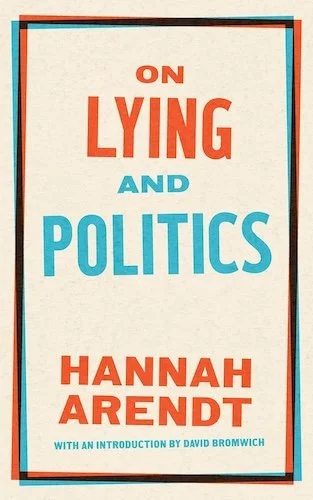On Lying and Politics
Hannah Arendt has got to be one of the most intriguing political and ethical thinkers of the twentieth century.
Born to a Jewish family in Germany in 1906, Arendt studied philosophy and in the years before the ascent of Hitler wrote a dissertation called Love and Saint Augustine. Arrested by the Gestapo in 1933 for the sin of researching antisemitism, she was sent to prison. Upon her release, she fled the country, landing in Paris where she provided assistance to Jewish émigrés. When Germany invaded France in 1941, she was forced to flee again, this time making her way to the United States, where she became a citizen and lived the rest of her life.
Maybe it’s just me, but I’ve sensed a renewed interest in Arendt’s writings of late, not coincidentally as nationalistic movements and political figures with varying degrees of authoritarian intent have emerged both here and around the world. For years I’ve been eyeing up her mammoth book The Origins of Totalitarianism and the much-debated Eichmann in Jerusalem: A Report on the Banality of Evil. I haven’t been brave enough to tackle them quite yet. So I’m taking baby steps.
On Lying and Politics (Library of America) is a slim volume comprised of two parts. First, an extremely dense philosophical essay called “Truth and Politics.” Second is a dense (but slightly more accessible) journalistic piece, “Lying in Politics.” Together, the combined essays—originally published in 1967 and 1971, respectively—deal with “the manufacture of lies both under a totalitarian regime and in the apparently free public life of a corrupted democracy,” as David Bromwich writes in a helpful introductory chapter.
Arendt’s reflections in the first essay stem from her observations of totalitarian governments, including most notably Nazi Germany and the communist Soviet Union. The second essay, meanwhile, deals primarily with the Vietnam War and the ways government mouthpieces in the United States continued to assure the American public of certain victory, even as the administration knew full well that things were, at best, heading for a stalemate . . . or, much more likely, toward catastrophic failure. It was “image-making as global policy—not world conquest, but victory in the battle ‘to win people’s minds.’” Meanwhile, actual human casualties—soldiers and civilians alike—mounted by the day.
We’re once again (or still?) living in a time when facts and opinions are conflated or confused, when truthfulness is actively attacked and disinformation is weaponized for political gain. And make no mistake: when this happens, we all lose. Nobody wins, not really.
Arendt writes:
“Facts and opinions, though they must be kept apart, are not antagonistic to each other; they belong to the same realm. Facts inform opinions, and opinions, inspired by different interests and passions, can differ widely and still be legitimate as long as they respect factual truth. Freedom of opinion is a farce unless factual information is guaranteed and the facts themselves are not in dispute.”
Late in the first essay, Arendt references a line from Dostoevsky’s famous passage in The Brothers Karamazov: “Above all, don’t lie to yourself. The man who lies to himself and listens to his own lie comes to a point that he cannot distinguish the truth within him, or around him, and so loses all respect for himself and for others. And having no respect he ceases to love.”
Lord have mercy, may we heed that warning—first and foremost in our own hearts and minds, but also when considering the leaders we would choose to endorse and empower.
Friends, the stakes are high. And I’m not only talking about an election.
